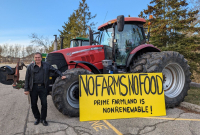In Ontario, it's harder than ever to appeal local developments

Groups frustrated by the Ford government’s “sledgehammer” approach limiting development appeals say they’re now powerless to prevent urban sprawl, loss of farmland, and squandered green space in the province.
Among other changes, Ontario’s Bill 185, known as the "Cutting Red Tape to Build More Homes Act” limits third-party challenges to municipal plans and zoning heard by the Ontario Land Tribunal and dismissed appeals scheduled after April 10. The new rules were introduced by the provincial government to expedite construction of 1.5 million homes by 2031.
When the bill was proposed, the Ontario government said it was needed to speed development approvals to get badly needed housing built.
“These measures recognize the struggles that our municipal partners have faced in building homes and are targeted at removing those obstacles,” said Paul Calandra, Minister of Municipal Affairs and Housing in the statement.
That didn’t sit well with some community groups, including Ottawa’s Glebe Community Association (GCA) which had hoped to appeal a major new city development.
“When governments remove rights, they must do so carefully and judiciously,” said Carolyn Mackenzie, GCA’s planning chair. “Not with a sledgehammer, as the Ford government has done here.”
Housing supply and affordability is a serious issue across the country, where provincial governments are striving to build more homes faster. And Ontario is not the only province flexing its muscle in areas that were once the exclusive purview of municipalities, which are more susceptible to pressure from community groups to maintain the status quo.
In B.C., Premier David Eby recently introduced new housing legislation overriding municipal zoning to allow multiplexes in some neighbourhoods, blaming NIMBYism, outdated municipal zoning laws and red tape for undue delays.
However, in Ontario, the changes to Bill 185 are meeting with more specific and strident resistance. A coalition of advocates and concerned citizens warn the amendments will have significant consequences. They argued the changes could fuel rampant urban sprawl, run roughshod over natural areas and strip communities of their right to challenge municipal decisions.
When the new rules arrived, the GCA was already in the midst of challenging the City of Ottawa over contentious redevelopment plans for Lansdowne Park, and planned an appeal to the Ontario Land Tribunal. However, appeal was dashed by Bill 185.
The association filed an appeal with the Ontario Land Tribunal in December, but a quagmire of delays and mismatched deadlines meant it wasn’t heard before the law passed.

“Removing third party appeal rights takes us further down the road of the public feeling powerless – not apathetic, but powerless to hold the government accountable,” said Mackenzie.
The city did solicit community feedback before approving the Lansdowne development, which includes 800 housing units in two new residential towers, a 5,500-seat event centre, and new north-side seating at TD Place stadium. Two online surveys in 2023 garnered 2,700 responses that helped staff gauge public knowledge of the proposal, the city’s website states. The city also held public meetings and more in-person events are planned this summer. Requests for an interview by Canada’s National Observer about why the project was approved, were not granted.
GCA insists it does not oppose more housing but said it could be built in other places without sacrificing green space, Mackenzie explained.
“We are in a housing crisis, we all know that. Affordable housing is a particular problem,” she said. However, the COVID-19 pandemic also highlighted the importance of green space for mental and physical health, she added.
“Our appeal was in process, we had already incurred significant legal costs in good faith, but it was dismissed,” Mackenzie said.
Kevin Thomason, vice-chair of the environmental advocacy group Grand River Environmental Network, said the Ontario Land Tribunal has always been weighted in favour of developers, but at least third-party appeals were possible.
Now it has been reduced to a developer-only tribunal and should be eliminated completely, he added.
Phil Pothen, land use and development program manager at Environmental Defense said removing appeal rights is a "recipe for widespread corruption."
“The Ontario government has removed appeal rights for almost everyone except for literal NIMBYs,” Pothen said. “While Bill 185 prohibits watchdog groups and farmers from demanding independent oversight of decisions needlessly bulldozing farms or destroying wildlife habitat, last-minute changes mean that elite house-owners can still use appeals to block the legalization of environmentally-friendly apartments, supportive housing or affordable housing in their affluent residential neighbourhoods.”
By eliminating meaningful, independent oversight of development approvals outside existing built-up areas, he fears Bill 185 is likely to increase incidents similar to the provincial Greenbelt scandals.
“Together, the new law and the proposed repeal of the Provincial Policy Statement and Growth Plan for the Greater Golden Horseshoe will effectively wipe out the protective Settlement Area Boundaries and Municipal Comprehensive Review processes that prevent low-density sprawl from destroying what remains of farmland and natural areas outside the Greenbelt,” Pothen said.
Canada’s National Observer reached out to the Ontario Ministry of Municipal Affairs and Housing, and Ministry of Red Tape Reduction, but did not receive a reply in time for publication.
“We’re not going to micromanage and dictate a one size-fits-all approach across the province. Municipalities know their communities best – they know where it makes sense to build homes,” Calandra said. “That’s why we’re supporting them by giving them the funding and tools they need to build much-needed infrastructure and more housing, of all types.”







Comments
Asked about concerns relating to the protection of natural heritage, agricultural lands, and legal rights, Calandra issues speaking points about building houses and infrastructure. Ontario is descending into a purposeful kleptocracy.
Doug "the thug" Ford is nothing short of a criminal and has abuse his power for the good of his own pocket and those of his corrupt developer donor buddies. Doug has done ZERO for the good of Ontarians given backdoor shady secret deals. Doug needs to go, remember this when the next election arrives. All his secret deals need to be investigated and how he managed to accumulate so much wealth on a premier's salary. I am sure there is far deeper corruption happening that has yet to be found.
The sudden closure of the Ontario Science Centre is another scam by Ford, it would be cheaper to repair the roof of the Science Centre than to relocate it into a inferior facility at Ontario Place. Again, this is about filling the pork barrels of one or more of his corrupt developer donors.
Doug "the thug" Ford is not to be trusted with managing our province and to do what is best for the Ontarians. Doug is not better than Trump, a grifter and scam artist.
Also, where were the opposition parties when Doug decide to ram Bill 185 in law? Why the lack of bell ringing and red-alerts over what Doug was doing? The opposition failed to make this bill a major issue in the media, as it has far reaching impacts and gives Doug and his corrupt developer donors free range to rape and pillage Ontario. None of what Doug is doing is about housing, it's all about lining his pockets and filling the pork barrels of his corrupt developer donors.